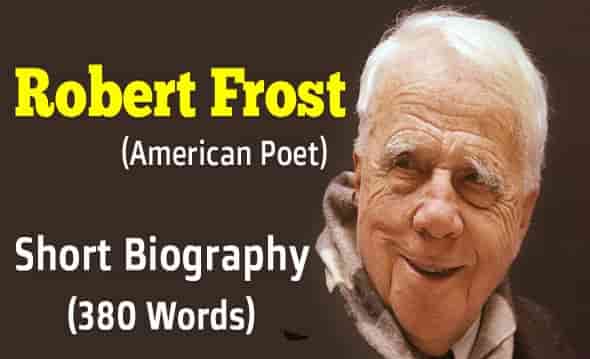Robert Frost Short Biography
Robert Lee Frost was born on March 26, 1874 in San
Francisco, California. He was a noted and critically respected American Poet of
20th Century. The majority of his work had been published in England as well as
America. He is still known for his realistic depictions of rural life and his
command over colloquial speech. In the early twentieth century, most of his
work revolved around rural life in New England which he used to examine complex
social and philosophical themes.
Childhood
Robert Frost was born to journalist father William
Prescott Frost, Jr. and mother Isabelle Moodie. After William’s death in May
1885, the family moved to Lawrence, Massachusetts.
Education
In 1982, Robert Frost graduated from Lawrence High
School. Frost's mother joined the Swedenborgian church and had him baptized in
it, but he left it as an adult. Frost grew up in the city, and he published his
first poem in his high school magazine.
Career
In 1894 he sold his first poem, "My Butterfly An
Elegy" to the New York Independent for $15. From 1906 to 1911, he joined
New Hampshire's Pinkerton Academy as an English teacher and later joined New
Hampshire Normal School in Plymouth, New Hampshire. In 1912, Frost sailed with
his family to Great Britain, in a small town outside London. In 1913 his first
book of poetry “A Boy's Will” got published and “North of Boston” in 1914.
With the start of World War I, Robert Frost returned
to America in 1915 and settled in New Hampshire. From 1916 onwards he joined
Amherst College in Massachusetts as a teacher in English and became active in
his writing career. His noted work “West Running Brook”, “The Gold Hesperidee”,
“From Snow to Snow” and much more came during this period.
Awards and Honors
Robert Frost received his first Pulitzer Prize in 1924
for “New Hampshire”, followed by in 1931 for Collected Poems, in 1937 for “A
Further Range” and in 1943 for “A Witness Tree”. In 1960, he received the
United States Congressional Gold Medal for "In recognition of his poetry”
which enabled the culture of the United States and the philosophy of the world.
At the End
He became one of America's rare "public literary
figures, almost an artistic institution. On 29th January, 1963, he died in
Boston, of complications from prostate surgery. He was buried at the Old
Bennington Cemetery in Bennington, Vermont.
Suggested : Rabindranath Tagore Short Biography






No comments:
Post a Comment